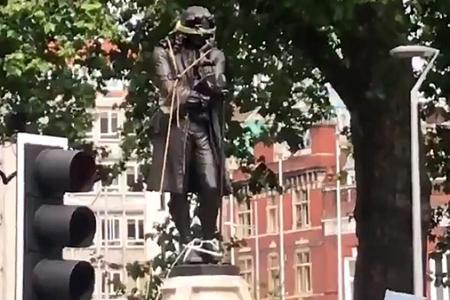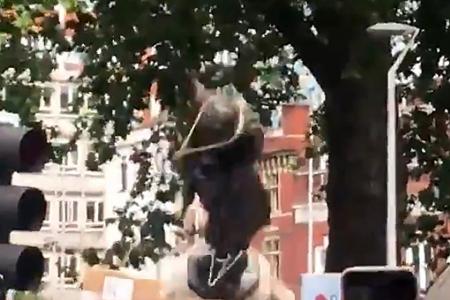English slave trader’s statue toppled in anti-racism protests
LONDON: Politicians in Britain yesterday condemned the destruction of a statue of a colonial slave trader during an anti-racism protest, but a leading heritage body said there was no need to reinstate it.
Demonstrators pulled down the 5.5m bronze monument to Edward Colston in the south-west English city of Bristol and threw it into the harbour on Sunday.
The protest was one of many across Britain in recent days in response to the death of Mr George Floyd, an unarmed black man, at the hands of the police in the United States.
Home Secretary Priti Patel said the toppling of the Bristol statue was "utterly disgraceful" and one of her ministers, Mr Kit Malthouse, said criminal damage charges should be brought.
Leader of the main opposition Labour party Keir Starmer said it was "completely wrong" to pull down the statue in that way.
But he said that in view of Colston's role as a top official in the Royal African Company in the late 17th century, it should have been removed "a long time ago" and put in a museum.
"This was a man who was responsible for 100,000 people being moved from Africa to the Caribbean as slaves, including women and children who were branded on their chests with the name of the company he ran," he told LBC radio.
Formula 1 icon Lewis Hamilton threw his weight behind the protesters, writing on Instagram: "TEAR THEM ALL DOWN. Everywhere...
"Edward Colston was a monster who bought, sold and traded Africans, human beings, and forced them into slavery until they died... I'm proud of the activists and organisers in Bristol."
PHILANTHROPIST
Colston, who came from a wealthy merchant family, was also a Member of Parliament and philanthropist, donating huge funds to support schools, hospitals, almshouses and churches.
Mr Marvin Rees, Bristol's elected Labour mayor, said he believed the statue would end up in a museum, alongside banners from Sunday's Black Lives Matter protest.
Mr Rees, who is of Jamaican heritage, said he "cannot condone the damage" but described the destruction of the statue as an "iconic moment".
"I cannot pretend it was anything other than a personal affront to me to have it in the middle of Bristol, the city in which I grew up," he told BBC radio. - AFP
Get The New Paper on your phone with the free TNP app. Download from the Apple App Store or Google Play Store now




